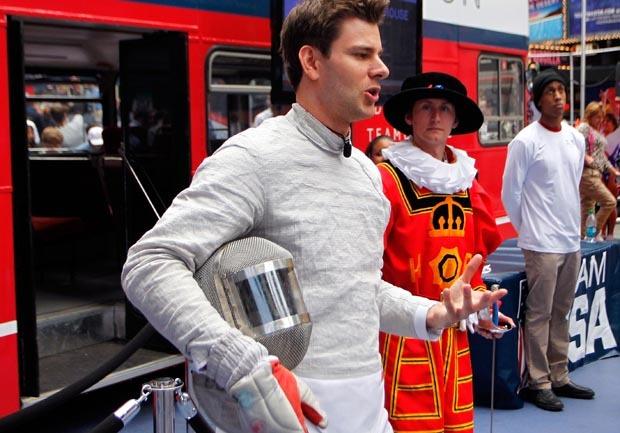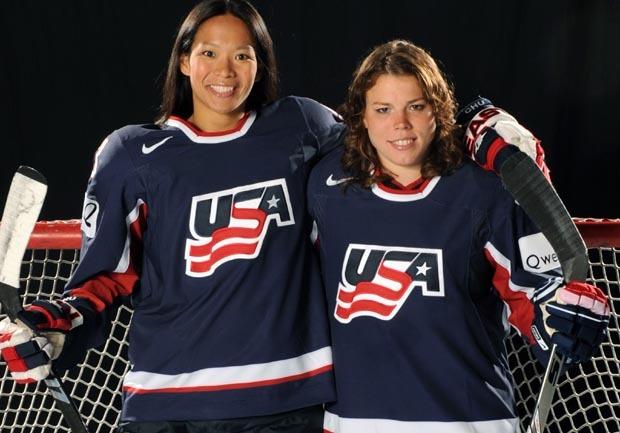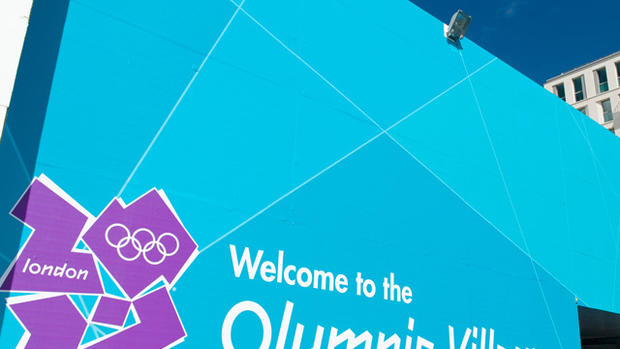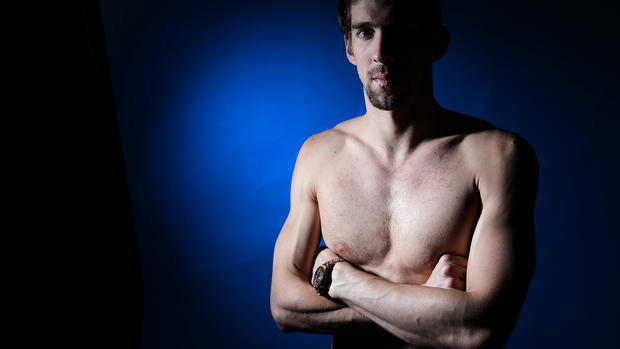Olympic village: Business or pleasure?
(CBS News) American fencer Tim Morehouse is in London with his sights set on an Olympic gold medal. But before he picks up his sabre, he must navigate the Olympic village - a surreal community he says is part United Nations, part university campus.
"It's sort of like a glorified college experience, like orientation week," said Morehouse, who won a silver medal at the 2008 Games in Beijing. "It's a lot of people-watching, trying to figure out what sport someone plays based on body type... There's a lot of overdeveloped muscles."
The Olympic village in London is home to more than 10,000 of the world's elite athletes - a superior gene pool tailor made for Olympic ogling. But what really goes on behind the tightly guarded fences where the fittest humans on the planet intermingle?
Recent news stories and a new book depict the village as a raunchy frat house spilling over with wild parties and sexual liaisons. But Team USA's Morehouse is among several Olympians who told CBSNews.com that the village is more about discipline than debauchery.
"There's an element of partying but a strong element of business in terms of sponsors and promoting your sport as well," said Morehouse. "Everyone is there to represent their country in the best possible way."
Still, a less chaste image persists. Every Olympics, the media enthusiastically pounces on one storyline: the number of condoms at the athletes' village. This year, you can even place a wager on whether the village supply will be depleted - a tragedy that befell the 2000 Sydney Games. (For the record, the Daily Mail reports 150,000 prophylactics will be on hand in London - 50,000 more than the last Olympics in Vancouver).
Such headlines baffle Steve Holcomb, a two-time Olympian who piloted the USA 4-man bobsled team to an Olympic gold medal in Vancouver.
"I have never seen a single condom at the Olympics," he laughed. "I hear stories about it being party central and a sex fest and I say, 'I have no idea what you're talking about.'"
Several Olympians, including U.S. women's soccer goalkeeper Hope Solo, recently told ESPN The Magazine that athletes had sex on the Olympic village grass, in whirlpools and on balconies. In a new book called "The Secret Olympian," the author - an anonymous member of Team Great Britain at the 2004 Games - reports "sex, and plenty of it, increasing exponentially through the Games."
That elicits a laugh from Caitlin Cahow, a member of the U.S. women's ice hockey team that won silver at the 2010 Vancouver Olympics.
"I think it's funny there is this whole mystique," said Cahow, who added the Olympic sex romp myth has been a source of amusement among her teammates. "We actually joke about it because we don't think it's the reality."
So what is the reality? Cahow's hockey teammate Julie Chu puts it like this: Like anyone, some Olympians have sex during the Games "but not to the scale where it's like, 'What is going on?'"
Many athletes agree the biggest temptation in the village isn't sharing beds but swapping clothes. "The Secret Olympian" author lays out several "commandments" of village etiquette, among them: "Be ready to barter, it's rude not to."
Chu said athletes are given two suitcases packed with Team USA gear upon arrival at the village and the contents are valuable currency. The dining hall - the village hub of cross-nation mingling - is where athletes check out the most desirable attire from other countries. A member of the Swedish hockey team ran a thriving business at the Vancouver Games.
"She would say 'come, come into my Swedish store,'" Chu recalled. "She had great stuff."
So did other Northern European countries, according to Cahow, who snagged a magenta "Dick Tracy" hat courtesy of Latvia in 2006. "It's interesting to hear all the broken languages trying to orchestrate trades," she said.
If the Olympic village dining hall is the center of international commerce, the weight room is a global reality check. Holcomb, 32, said that while training in Utah, he and his bobsled teammates were "top dogs" in the weight room, spending at least three hours a day there. At the 2010 Games, not so much.
"I remember walking into the weight room in Vancouver and all of a sudden every single person in that gym is the best athlete in the world," he said. "All of a sudden you're just some Joe Schmo walking in. Nobody cared who you are."
Athletes may be on equal footing in the village, but expectations vary greatly depending on where you call home. Cahow said that as an American Olympian, she felt pressure not just to win, but to win gold. That's not the case for everyone. In 2010, she met a Winter Olympian from Iran who had never seen snow until he was 18 years old and was grateful simply to be in Vancouver.
"Here I am worrying about winning a gold medal and here is a guy who is there because he wants to wear his flag," Cahow said. "Everyone's dream is a little different."
When athletes finish competing, they start partying. But "The Secret Olympian" offers up this cautionary commandment: "Thou may party, but do not, on pain of death, disturb Olympians still in competition." Chu said everyone abides by this rule because some athletes - like the hockey team - were competing right up until the closing ceremony and needed total focus throughout.
Holcomb's party schedule was also hijacked by scheduling. After his team won gold, they picked up their medals, attended the flower ceremony, were whisked away in a van, ordered to give a urine sample and taken to the closing ceremony, denying him the chance to really cut loose: "I was bummed," he said. "They said, 'party's over, man.'"
Olympians recalled similar emotional arcs during their time at the village: First, a nervous excitement upon arrival ("It's a little intimidating when you get there," Morehouse admits); then, a sense of awe during the opening ceremony ("you become your childhood self," Cahow says); next, a period of bonding with athletes and total focus leading up to competition ("it's all business," Holcomb insists). Finally, a celebratory release when competition is over and at the closing ceremony.
For some, that release means wild parties. For others, it means hanging out with family. And for freestyle aerial skier Ashley Caldwell - who at 16 years old was the youngest member of the U.S. Olympic team in 2010 - it meant a late-night rendezvous with the ultimate symbol of American patriotism.
"My idea of excitement," she said, "was staying out late and going to McDonalds at 2 a.m."



